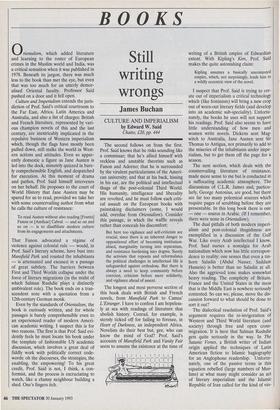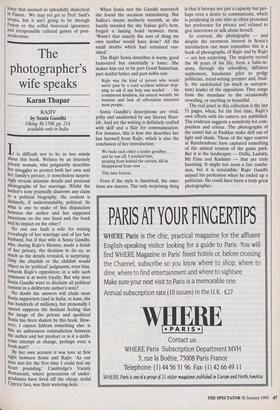BOOKS
Still writing wrongs
James Buchan
CULTURE AND IMPERIALISM by Edward W. Said Chatto, £20, pp. 444 0 rientalism, which added literature and learning to the roster of European crimes in the Muslim world and India, was a critical sensation when it was published in 1978. Beneath its jargon, there was much less to the book than met the eye, but even that was too much for an utterly demor- alised Oriental faculty. Professor Said pushed on a door and it fell open.
Culture and Imperialism extends the juris- diction of Prof. Said's critical courtroom to the Far East, Africa, Latin America and Australia, and also a list of charges: British and French literature, represented by vari- ous champion novels of this and the last century, are inextricably implicated in the repulsive business of Western imperialism which, though the flags have mostly been pulled down, still stalks the world in West- ern actions and attitudes. Even so appar- ently domestic a figure as Jane Austen is led into the dock, minutely quizzed in bare- ly comprehensible English, and despatched for execution. At this moment of drama and pathos, Prof. Said himself intervenes on her behalf. He proposes to the court of World History that Jane Austen may be spared for us to read, provided we take her with some countervailing author from what he calls the culture of resistance:
To read Austen without also reading [Frantz] Fanon or [Amilcar] Cabral — and so on and so on — is to disaffiliate modern culture from its engagements and attachments.
That Fanon advocated a regime of violence against colonial rule — would, in Prof. Said's literary scheme, have bust into Mansfield Park and roasted the inhabitants — is attenuated and excused in a passage of great subtlety. The barriers between First and Third Worlds collapse under the force of literary migrations (in the midst of which Salman Rushdie plays a distinctly ambivalent role). The book ends on a tran- scendent note with a quotation from a 12th-century German monk.
Even by the standards of Orientalism, the book is curiously written, and for whole passages is barely comprehensible even to an experienced reader of modern Ameri- can academic writing. I suspect this is for two reasons. The first is that Prof. Said evi- dently feels he must locate his book under the template of fashionable US academic discussion, which involves a great deal of fiddly work with politically correct code- words: oh the discourses, the strategies, the enabling, the empowering! To his great credit, Prof. Said is not, I think, a con- formist, and the process is excruciating to watch, like a clumsy neighbour building a shed. One's fingers itch. The second follows on from the first. Prof. Said knows that he risks sounding like a commissar; that he's allied himself with reckless and unstable theorists such as Fanon and Adorno; that he is surrounded by the virulent particularisms of the Ameri- can university; and that at his back, hissing in his ear, are the political and intellectual thugs of the post-colonial Third World. His humanity, intelligence and liberality are revolted, and he must follow each criti- cal assault on the European books with painstaking disclaimers (some, I would add, overdue from Orientalism). Consider this passage, in which the waffle reveals rather than conceals his discomfort:
But here too vigilance and self-criticism are crucial, since there is an inherent danger to oppositional effort of becoming institution- alised, marginality turning into separatism, and resistance hardening into dogma. Surely the activism that reposits and reformulates the political challenges in intellectual life is safeguarded against orthodoxy. But there is always a need to keep community before coercion, criticism before mere solidarity, and vigilance ahead of assent.
The longest and most perverse section of this book deals with British and French novels, from Mansfield Park to Camus' L'Etranger. I have to confess I am hopeless- ly at sea with readings of literature that abolish history. Conrad, for example, is sternly ticked off for failing to foresee, in Heart of Darkness, an independent Africa. Novelists do their best but, gee, who can know the mind of God? Prof. Said's accounts of Mansfield Park and Vanity Fair seem to assume the existence at the time of writing of a British empire of Edwardian extent. With Kipling's Kim, Prof. Said makes the quite astonishing claim:
Kipling assumes a basically uncontested empire, which, not surprisingly, leads him to a wildly eccentric view of the novel.
I suspect that Prof. Said is trying to cre- ate out of imperialism a critical technology which (like feminism) will bring a new crop out of worn-out literary fields (and develop into an academic sub-speciality). Unfortu- nately, the books he uses will not support his readings. Prof. Said also seems to have little understanding of how men and women write novels. Dickens sent Mag- witch to Australia, Jane Austen sent Sir Thomas to Antigua, not primarily to add to the miseries of the inhabitants under impe- rialism, but to get them off the page for a season.
The next section, which deals with the countervailing literature of resistance, made more sense to me but is conducted in a suffocating academic atmosphere. The discussions of C.L.R. James and, particu- larly, George Antonius, are good, but there are far too many polemical sources which require pages of scrubbing before they are presentable. In this long book there is one — one — source in Arabic. (If I remember, there were none in Orientalism).
The dual pitfalls of both modern imperi- alism and post-colonial thugishness are exemplified in a discussion of the Gulf War. Like every Arab intellectual I know, Prof. Said nurses a nostalgia for Arab nationalism which now has little correspon- dence to reality: one senses that even a tin- horn Saladin (Abdul Nasser, Saddam Hussein) is better than no Saladin at all. Also the aggrieved tone makes somewhat heavy reading. The complicity of Britain, France and the United States in the mess that is the Middle East is nowhere seriously contested. So can we, please, move the dis- cussion forward to what should be done to sort it out?
The dialectical resolution of Prof. Said's argument requires the re-invigoration of Western and Third World literature (and society) through free and open cross- migration. It is here that Salman Rushdie gets quite seriously in the way. In The Satanic Verses, a British writer of Indian origin applied the techniques of Latin American fiction to Islamic hagiography for an Anglophone readership. Unfortu- nately, one of the passive terms in this equation rebelled (large numbers of Mus- lims) at what many might consider an act of literary imperialism and the Islamic Republic of Iran called for the kind of vio- knee that seemed so splendidly dialectical in Fanon. We may yet get to Prof. Said's utopia, but it ain't going to be through Fanon or the wilful historical ignorance and irresponsible cultural games of post- modernism.











































































 Previous page
Previous page